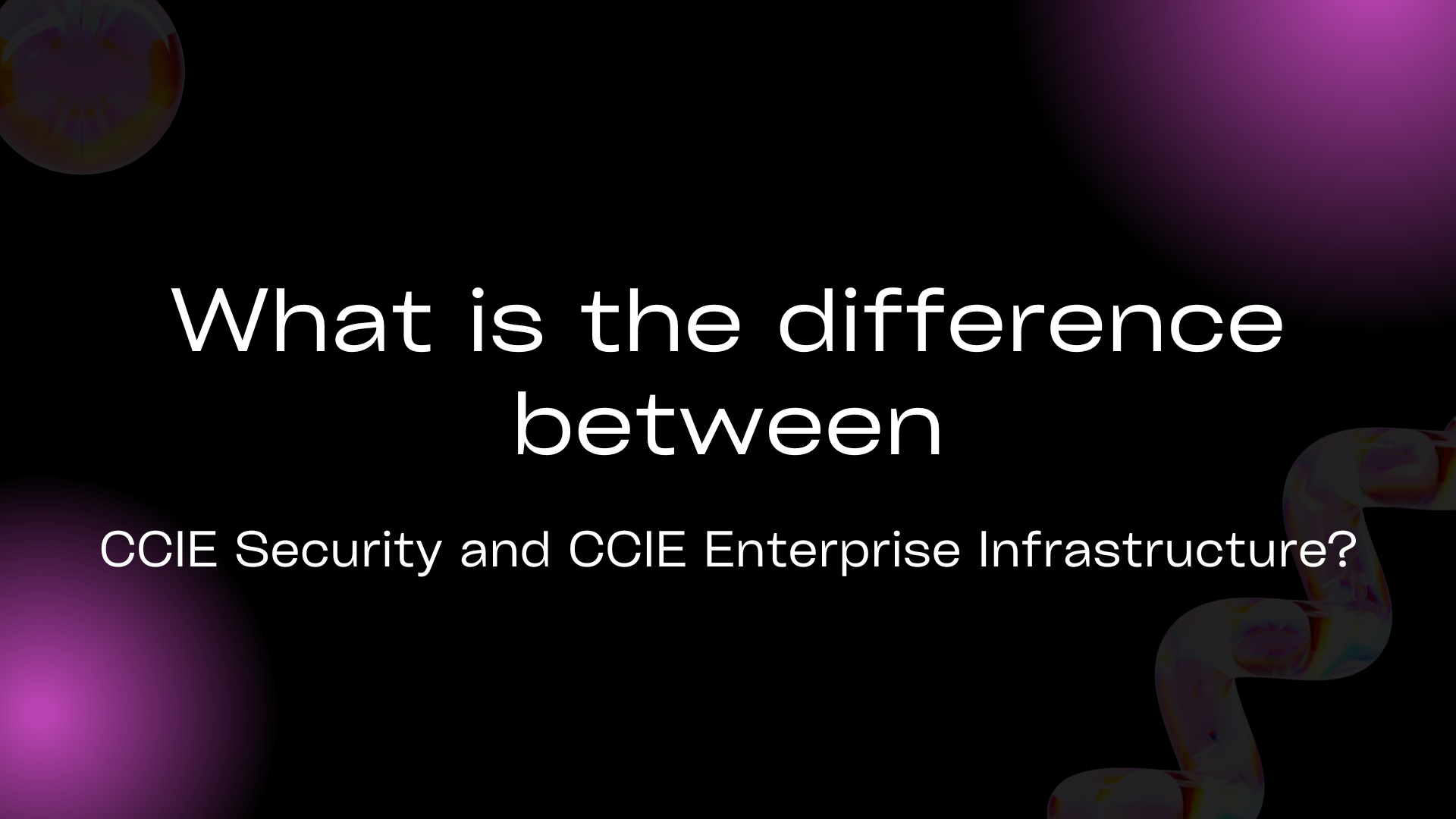What is the difference between CCIE Security and CCIE Enterprise Infrastructure?

The Cisco Certified Internetwork Expert (CCIE) certifications in Security and Enterprise Infrastructure are highly regarded in the IT sector for their depth and rigor. They represent pinnacle achievements for network professionals. While both credentials signify advanced expertise, they cater to distinct career paths:
- CCIE Security focuses on cutting-edge network
- CCIE Enterprise Infrastructure centers on holistic enterprise network
This article aims to delineate these differences, guiding IT professionals in aligning their career aspirations with the appropriate certification.
Overview of Certifications
CCIE Enterprise Infrastructure:
The CCIE Enterprise Infrastructure certification is tailored for professionals aiming to excel in advanced Enterprise Networking. It’s an ideal path for those who seek expertise in designing, managing, and optimizing sophisticated network systems. This certification encompasses a wide spectrum of topics essential for setting up and maintaining large-scale networks efficiently.
Key aspects of the CCIE Enterprise Infrastructure certification include:
- Network Design and Implementation: Understanding how to create robust network architectures, integrating various technologies to support organizational
- Advanced Routing and Switching: Mastery over complex routing protocols and switching techniques crucial for large network
- Network Optimization: Skills in enhancing network performance and reliability, ensuring optimal
- Security and Automation: Incorporating security measures and automation processes to streamline network
This certification prepares professionals to tackle real-world networking challenges, making them adept at managing diverse and dynamic network environments. It’s especially valuable for those aspiring to high-level roles like Senior Network Engineer or Network Infrastructure Manager, where a deep understanding of extensive network systems is crucial.
CCIE Security:
The CCIE Security certification is specifically designed for network professionals who are focused on the field of Security. This certification offers in-depth knowledge and expertise in Securing Networks and systems against a wide array of Cyber threats, making it an essential credential for Security Specialists.
Key aspects of the CCIE Security certification include:
- Advanced Security Concepts: It covers a comprehensive range of security topics, including the latest in firewall technologies, intrusion prevention systems, and secure network
- Emerging Security Technologies: The certification keeps pace with the latest developments in security, such as cloud security, endpoint protection, and encryption
- Practical Application: Beyond theoretical knowledge, the certification emphasizes the practical application of security measures, teaching how to implement and manage security solutions effectively in real-world
- Risk Management and Mitigation: Professionals learn to identify potential security risks and deploy strategies to mitigate these threats, ensuring network
This certification is ideal for those aspiring to roles such as Security Architect, Security Engineer, or Chief Information Security Officer. It prepares candidates not just to understand the current landscape of network security but also to anticipate and respond to emerging security challenges, making them invaluable assets in protecting complex network infrastructures.
Comparative Analysis
The comparative analysis contrasts CCIE Security, focusing on network security, with CCIE Enterprise Infrastructure, covering broader network engineering aspects, and highlighting differences in content, skills, and career paths.
Table:
| Aspect | CCIE Security | CCIE Enterprise Infrastructure |
| Focus | Network security, protection against cyber threats | Comprehensive Network Engineering |
| Content | Advanced Security technologies, threat management | Network Setup, Management, optimization |
| Skills Taught | Cyber Security, Intrusion prevention, risk management | Design, implementation, and troubleshooting of network systems |
| Ideal for | Professionals interested in cyber security roles | Those aspiring to manage large Network infrastructure |
| Career pathways | Security analyst, security architect, network security engineer | Network engineer, network administrator, infrastructure specialist |
| Industry relevance | High demand in security-focused roles | Broad applicability in diverse networking environments |
Certification Process
- Common Structure:
- Both certifications require passing two stages: a written exam followed by a practical lab
- Written Exam:
- Tests theoretical knowledge and understanding in the specific certification area (Security or Enterprise Infrastructure).
- Lab Test:
- Focuses on practical, real-world
- Candidates must demonstrate hands-on expertise in a lab
- Preparation:
- In-depth study and practical experience in the chosen field are
- Preparation often involves training courses, self-study, and extensive lab
- Expertise Demonstration:
- Successfully passing these exams signifies a high level of proficiency and
- Exam Specifics:
- Each certification has its unique exam format and requirements, tailored to its area of focus (security or network engineering).
Career Pathways
| Aspect | CCIE Security | CCIE Enterprise Infrastructure |
| Focus | Specializes in network and data security. | Specializes in managing and optimizing large-scale networks. |
| Job Roles | Security Consultant, Security Analyst, Chief Information Security Officer. | Network Engineer, Network Architect, Infrastructure Manager. |
| Key Responsibilities | Protecting networks against cyber threats, managing security protocols. | Designing, implementing, and overseeing extensive network systems. |
| Potential Earnings | Generally high, influenced by factors like experience and location. | Also high, with variations based on role, experience, and geographical area. |
Future trends and Developments
| Aspect | Future Trends | Impact on certification |
| CCIE Security | · Increasing focus on cloud security.
· Utilization of artificial intelligence (AI) in threat detection. · Enhanced security measures for the Internet of Things (IoT). |
· Potential updates to include cloud-based security solutions.
· Emphasis on AI-driven security practices. |
| CCIE Enterprise Infrastructure | · The rise of 5G technology.
· Growth of software-defined networking (SDN). · Expansion of edge computing technologies. |
· Possible inclusion of 5G and SDN topics.
· Preparation for managing next-generation network environments. |
Emerging trends in network security, like enhanced cloud security and AI in threat detection, are likely to influence updates in the CCIE Security certification, focusing on cloud and AI-based security.
Meanwhile, in Network Infrastructure, the rise of 5G, SDN, and edge computing is expected to impact the CCIE Enterprise Infrastructure Certification, introducing these cutting-edge topics to prepare for future network environments.
Conclusion
The CCIE Security certification is tailored for those pursuing a career in cybersecurity. It delves deeply into network security, equipping professionals with skills to protect systems from cyber threats.
On the other hand, CCIE Enterprise Infrastructure is designed for broad network engineering roles. It encompasses comprehensive skills in managing and optimizing large network systems, making it ideal for those interested in overseeing extensive Network Infrastructures.
When choosing between the two, consider your career aspirations, focus on Network Security with CCIE Security or broader Network Management with CCIE Enterprise Infrastructure.


